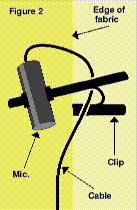
Sound Advice
A few tips for better sound recording
|
Some talking newspaper groups have the luxury of a permanent recording studio with sound insulation and acoustic treatment. Many, like the Maidenhead group, record in members' homes and other locations which, while being far from ideal, can nevertheless give good results. This section picks out a few things we can do to achieve good sound. I hope it will be useful to new recordists and readers, and to those hosting recording sessions. It may also be helpful for other groups who are starting up without any sound recording experience. It's not difficult to achieve good results but there are some pitfalls for the unwary. The important thing to remember is that our main aim is to achieve the best intelligibility - not necessarily the highest fidelity. The majority of our blind listeners are elderly, and some will have imapaired hearing too. Choice of RoomOne thing we're trying to avoid is a boomy sound that gives the impression that the recording was made in a broom cupboard. This effect is caused by lots of reflections from walls, ceiling, floor and table arriving together at the microphone. To minimise it note the following points:
Where to Record
Distance is ImportantSound obeys the inverse square law. That is to say that the sound level is inversely proportional to the square of the distance from the source. In other words if you double the distance from the reader's mouth to the microphone the direct sound level is reduced to one quarter of what it was. However the reflected sound and background noise undiminished. You will need to increase the gain which will bring up the background noise.
The best distance for a tieclip microphone is about 15cm - a bit more for a directional mic on a desk or floor stand. The mic should be out of the direct line of the breath when reading, i.e. off to one side. A tie-clip microphone should be fitted pointing away from the mouth, with the cable looped back through the clip (see figure 2). These microphones are omnidirectional, so do not have to point directly at the sound source. Headworn microphones have the advantage that the mic is a constant distance from the mouth even if the reader turns his or her head. TablesSound is reflected off hard surfaces, and the table top can be just as important as the walls and ceiling, if not more so. Studio tables are usually perforated to let the sound through, but this is not an option in the home. Therefore the table should be covered with sound absorbing material such as a thick blanket or a candlewick bedspread folded double. Desktop microphone stands are good at picking up sounds from the table like people fidgeting, tapping their feet on the table legs, putting down drink glasses, or even motor noises from the recorder. Shock mounts can reduce the problem but it is better to use floor stands with booms or tie-clip microphones. If you use a floor stand keep the base away from tapping feet! Story CardsIt is usual to paste news articles onto cards so that they are easy to manage and there no rustling of paper. These cards reflect sound back into the microphone so can affect the recording. They should be no bigger than fronts of Corn Flake packets, and smaller if possible. Avoid sticking articles low down on large cards since this will encourage readers to lean their heads forward, again affecting the sound. Noises OffThe human brain is very good at discriminating between the sounds it wants to hear and other noises. This is because the ears can pick up a lot of directional information such as phase and amplitude differences. Most of this information is lost when recording the sound picked up by one microphone, so on playback the noises will be more irritating and distracting. This will be apparent to the recordist when monitoring the sound on headphones. Noises will appear much more intrusive than they do when listening unaided in the room. For this reason it is best to eliminate or minimise as far as reasonably possible any extraneous noises such as refridgerator compressors, fans and central heating boilers. Turning the fridge or freezer off for 90 minutes won't hurt if the door is kept shut. The Readers ThemselvesThe selection of readers is important, but that's a topic for another page. However there are one or two things that all readers can do:
You may well think that much of this advice is unnecessary but believe you me, it's all based on experience! If you have any more useful recording tips please let me know (webmaster at maidenheadtn.org.uk). Richard Porter |
British Sound Recording Association
HOME - ABOUT US - CONTACT - WHAT'S NEW - LINKS
![]()
Last updated 22nd January, 2012
 Microphone placement can be critical, particularly if you have to record
in a small or rectangular room. Figure 1 shows the good and bad places to put
microphones and readers.
Microphone placement can be critical, particularly if you have to record
in a small or rectangular room. Figure 1 shows the good and bad places to put
microphones and readers.
 On the other hand
going too close to a microphone can produce other nasty
effects. The expulsion of breath on plosives (like Bs and Ps) directly into
the microphone can cause "popping" or "blasting",
breathing is more audible and with certain types of directional microphone the
"proximity effect" can boost low frequencies necessitating a bass
cut on the mixer or on the mic itself.
On the other hand
going too close to a microphone can produce other nasty
effects. The expulsion of breath on plosives (like Bs and Ps) directly into
the microphone can cause "popping" or "blasting",
breathing is more audible and with certain types of directional microphone the
"proximity effect" can boost low frequencies necessitating a bass
cut on the mixer or on the mic itself.